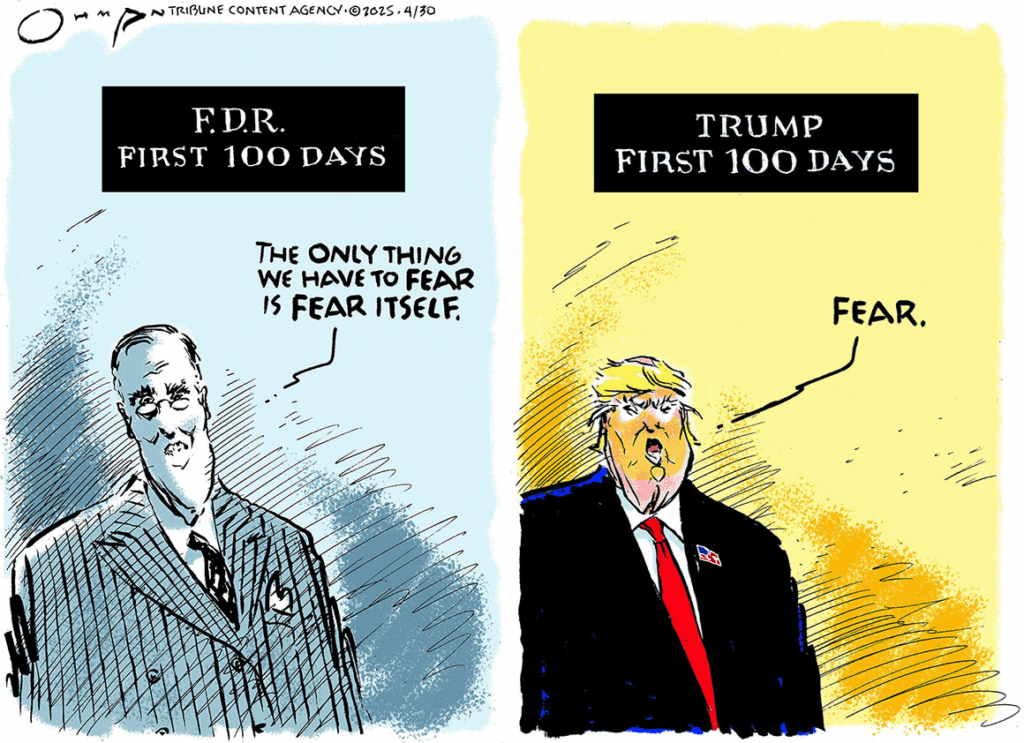“We’ve slid into some form of authoritarianism,” says Steven Levitsky, a professor of government at Harvard, and co-author of How Democracies Die. “It is relatively mild compared to some others. It is certainly reversible, but we are no longer living in a liberal democracy.”
Project 2025 and MAGA are trampling over well-established constitutional and legal boundaries. This is by now abundantly clear (including to the Republican justices on the Supreme Court). The Trump2 presidency represents a fundamental regime change (as set out in Project 2025’s “Mandate for Leadership: The Conservative Promise“). With the Roberts Court signaling last Thursday (a month after Levitsky’s assessment) endorsement of the unitary executive theory, it will become far tougher to restore a liberal democracy and commitment to the rule of law. This decision, when it comes, will represent a pivotal victory for the authoritarian vision that has captured the Republican Party.
Destroying the capacity of the federal government
In the first three months of Donald Trump’s second go-round in the White House, his administration has moved to dismantle — through wholesale closures of agencies established by Congress, mass firings in violation of laws enacted by Congress, and budget embargoes of funds appropriated by Congress — the capacity of the federal government to promote the public good. Elon Musk and DOGE, acting on the authority of the president, have led this reckless rampage.
[Set aside another objective of Project 2025, the coercion and harassment at the hands of Trump loyalists in departments (Justice, Homeland Security, …) and agencies (such as the SEC) to extract revenge against Trump’s (and MAGA’s) perceived political enemies, including elected officials, judges, law firms, media organizations, scientific establishments, nonprofits, outfits focused on campaigns and elections, as well as immigrants (including law-abiding folks authorized to be here). The Constitution and the rule of law have been swept aside to achieve these ends.]
Considering then just the deliberate demolition of federal infrastructure by shuttering agencies, purging staff, and blocking funds: It was clear almost immediately that the damage would be great and that rebuilding what was lost would be a steep, uncertain climb under the best of circumstances (beginning with MAGA opponents winning a handful of election cycles). That’s why the MAGA barrage was so rushed — to make recovery hugely difficult just in case anyone succeeded in putting a stop to it.
On Thursday, the Republican justices on the Supreme Court signaled that they will not put a stop to it and, more significantly, that they intend to ensure that recovery (even after a string of election victories by the MAGA opposition) will be next to impossible. First, some background:
The alphabet agencies and protecting Americans
In establishing independent agencies (the FTC, SEC, NLRB, CFPB, …) Congress has acted to promote the health, safety, security, and general welfare of Americans and to ensure that the agencies’ activities were shielded from undo interference by a president — limiting the power of the president to remove the appointed leaders of these agencies.
In 1935, after President Roosevelt challenged this limitation, firing a member of the Federal Trade Commission, the Supreme Court — in a unanimous 9-0 decision, Humphrey’s Executor v. United States — ruled that federal law prohibited FDR’s action. Thus, the court preserved the independence of these agencies, in contrast to executive agencies (Justice, Treasury, …) over which presidents possess greater control.
The enduring and often thwarted GOP agenda
Republicans loathe the independent agencies. Across many decades, the Republican Party has embraced two overriding goals: to lower taxes on the rich and to oppose federal regulations that constrain business (which impede the rich from getting richer). This remains so today, even though the first goal is unpopular even with the Republican base, while the second goal becomes unpopular when specifics are in play (rather than a general aspirational principle).
And since 1935 (and FDR and Humphrey’s Executor and the popularity of the protections that the alphabet agencies offer), a more powerful web of independent agencies have imposed more, and often more stringent, regulations on business. Republican presidents, and even Republican Congresses, have been incapable (or fearful) of shucking off the regulations imposed by the alphabet agencies. In fact, they have been unable even to appreciably reduce the size (and cost) of either the agencies or the federal government overall (ensuring that taxes remain too high for the tastes of the rich).
The scheme to undermine our democratic institutions
In response to Republican failures and frustration, the GOP, in a decades-long campaign funded by millionaires and billionaires, set out to achieve dominance of the third branch of the federal government: the judiciary. Republican-appointed justices have represented a majority on the Supreme Court for the past 50 years, but the party has been perennially displeased that too many Republican-appointed justices have been unwilling to stick to the party line; in this instance: to strangle the authority of the state to enact rules and regulations on business. A more radical agenda — something more draconian to achieve a lasting ideological victory — was born with the launch of the Federalist Society.
Set aside for now a comprehensive review of the activities of the Federalist Society, which has led the crusade not only to pack the federal bench, but to overturn established constitutional principles, federal legislation passed and signed into law, and judicial precedents going back decades (and even centuries). Make no mistake, this project is antithetical to the Constitution and our democracy.
This well-funded, meticulously planned campaign (like Project 2025) included manufacturing out of whole cloth an assortment of ideological ‘legal theories’ to give results-driven jurisprudence the patina of legitimacy. From originalism to the major questions doctrine to — in this instance — the unitary executive theory: all are ideologically-driven pretenses, though lacking in historical and textual support (whether in the Constitution or the Federalist Papers or other authoritative sources), that partisan Republican judges, lawyers, and constitutional scholars assert ought to guide the judiciary. Each purported principle can be appealed to, or ignored, to achieve the result that matches the agenda of the contemporary Republican Party. These theories mask partisan purpose.
After 50 years of Republican majorities on the Supreme Court, finally a dutiful majority is in place. All six Republican justices are tied to the Federalist Society and its methods and mission. The five men on the court have been throughout their professional careers, operatives of the Republican party. They were hand-picked to ensure that there would be No More Souters. This majority is more highly committed to advancing the agenda of the Republican Party than any other Supreme Court in the past nine decades; it is at least as dedicated to the MAGA project as the GOP leadership in Congress and much more dedicated to the fortunes of the party than the sitting president, who is far too self-absorbed to care much.
The corruption of the Roberts Court
The Chief Justice has asserted that judges just “call balls and strikes.” At his confirmation hearing, John Roberts intoned, “…Judges and Justices are servants of the law, not the other way around. Judges are like umpires. Umpires don’t make the rules, they apply them. The role of an umpire and a judge is critical. They make sure everybody plays by the rules, but it is a limited role.”
The Roberts Court — especially as the Republican majority has grown larger and more ideologically extreme — has systematically contradicted this pledge. From Shelby County v. Holder (2013) through Trump v. United States (2024) the pattern couldn’t be clearer. The Roberts Court has strived to change the rules by brushing aside — for instance — judicial restraint, stare decisis, the Fourteenth Amendment, the separation of powers, and most of all the authority of a democratically elected Congress to work its will.
It is Congress’s job to legislate. The Republican majority on the Roberts Court, in case after case, has usurped the authority of Congress. This is an imperial court with a corruptly partisan mission: to change the rules, so that even when the opposition party, the Democrats, win elections, they are barred by hook or by crook from putting in place Democratic public policies.
There is considerable evidence in the Constitution opposed to the autocratic view of the presidency that underlies the Federalist Society and Project 2025 campaigns. Furthermore, the Federalist Papers (authored by Madison, Hamilton, and Jay) reveal concern regarding presidential power, commitments to the separation of powers and to checks and balances, and establishment of a robust legislative branch.
2025: the opportune time for the authoritarian project
Last Thursday, the Republican justices tipped their hand with an unsigned ruling on the shadow docket. With Trump v. Wilcox (2025) the court has signaled (as Justice Elena Kagan advised in her dissent) that it is prepared to overturn Humphrey’s Executor. The court’s Republican majority appears ready to tightly secure the Trump/MAGA Republican agenda — an authoritarian agenda — in law that will be immune to change even in the aftermath of Democratic victories in future elections.
This anticipated decision, as Don Moynihan explains, embracing the unitary executive theory (that is, “the idea that the President has king-like powers”) will make it much more difficult to rebuild after the teardown.
Because with unitary executive theory, there is no actor that can make credible long-term commitments to public servants.
With unitary executive theory, Congress cannot write robust new legislation that modernizes the civil service and stops politicization. A President could just ignore it. Even if Trump leaves office, and a new President looks to restore nonpartisan competence, their promises are only good for four or eight years before another President can come in and rip up the terms of their employment. And over time, why would even a good government President invest effort in restoring capacity if their successor can undermine it?
With unitary executive theory, the public sector becomes permanently viewed as an unstable and chaotic workplace that we are seeing now. The most capable potential employees decide its not worth the bother, and the workforce becomes a mix of people who cannot get a job elsewhere, and short term political appointees. (The irony here is that advocates of unitary executive theory say it is not just constitutional, but will improve the performance of the public sector, notwithstanding the omnishambles we are witnessing now).
This court has already granted Donald Trump extraordinary power (in the form of immunity for criminal conduct) unknown to all previous presidents; it is poised to go further still. The consequences of Trump and Project 2025’s demolition across the federal government (as well as the war against knowledge and expertise in civil society) will be disastrous. Americans will be ill-served by the lost capacity of the federal government to do the job that we have come to expect of it. People will suffer. People will die.
The frenzied, wanton destruction wrought by Trump2 tramples on the Constitution, Congressional legislation, Supreme Court precedent, and contemporary American experience. It is a lawless endeavor. The Roberts Court’s willingness to change the rules of the game will offer the judiciary’s imprimatur to Trump2. The high court’s decisions become the law of the land.
Not yet the final reckoning
With the 2024 immunity decision and an anticipated 2025 unitary executive decision, recovery of our liberal democracy will be made enormously more difficult. That is the intent.
But, as my headline suggests, I regard this as match point, not game point. Americans committed to democratic governance, to the rule of law, to preservation of our freedom, and to a diverse, multi-ethnic, multi-religious nation must push back against the ugly MAGA vision of the United States — which undermines both our individual liberty and the vibrant institutions comprising our civil society.
Victories for democratic reform and a liberal society — harking back more than a century and a half — will be lost at the hands of the Trump2 administration and the Roberts Court. Many battles will have to be fought and won again.




